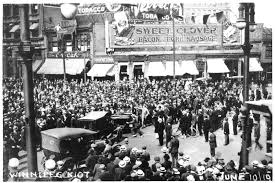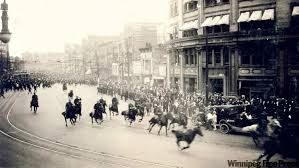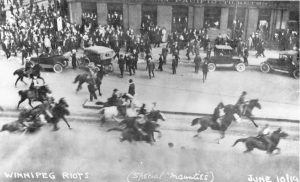Winnipeg, MB – One hundred years ago today the labour movement in Canada had learned clearly: it had to move into direct political action, if workers’ rights were to be protected. Today we celebrate the 100th anniversary of the beginning of The Winnipeg General Strike.

The Immediate post-World War 1 period in Canada was not a time of peace. Soldiers returned home wanting jobs and a normal lifestyle again, only to find factories shutting down and soaring unemployment. Corporate profiteering fed inflation and a high cost of living. Poor factory working conditions caused worker unrest. Social tensions grew.
Nowhere was this more evident than in Winnipeg, Manitoba. There, workers in the construction and metal industries attempted to strengthen their bargaining ability by creating umbrella unions – the Building Trade Council and the Metal Trade Council.
Workers from both industrial groupings went on strike to gain union recognition and to compel employers to respect collective bargaining rights.
The Building and Metal Trade Councils appealed for support from the Trades and Labour Union, the central union body representing the interests of many more of Winnipeg’s workers for support. The Trades and Labour Union voted in favour of a sympathetic strike. “Every organization but one has voted in favour of the general strike,” said Ernest Robinson – Secretary of the Winnipeg Trades and Labour Union.
The spark that ignited the Winnipeg General Strike was provided by Machinists from IAM Local Lodge 122 under the leadership of R.B. Russell and Peter Henrenchuk at Dominion Bridge.

By 11:00 am on Thursday May 15, 1919, virtually the entire working population of Winnipeg had gone on strike. Some 30,000 workers in the private and public sectors had walked off the job.
Business leaders and the governments they controlled reacted with repressive measures. The strike lingered through May and into June. The arrests of strike leaders J.S. Woodsworth (who later helped found and led the CCF Party, today’s NDP) and seven others on June 10th, 1919 led to clashes between protesters and the Royal Northwest Mounted Police. Clashes continued and on June 21, 1919, two workers were killed. Fearing more violence, the strike leaders called an end to the dispute on June 26, 1919. The end of the Winnipeg General Strike did little to bring labour peace to Canada in the summer of 1919; in fact, turmoil lasted into 1920.


To mark the 100th anniversary of the event, the IAM will be holding an Organizing Conference in Winnipeg May 23-24 and the IAM bus, built by Motor Coach Industries of Winnipeg, will be the center piece of the IAM contingent of the 2.5 kilometer-long parade being held Saturday May 25th to commemorate the 1919 General Strike.
-30-
Link to the Article from IAM Canada website: 100 years ago today the Winnipeg General Strike began and it was the Machinists who lit the fuse!


